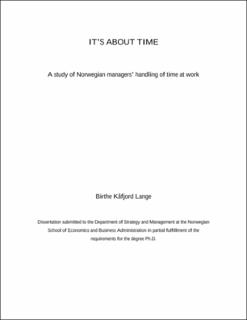| dc.description.abstract | This thesis enhances existing insights and knowledge about how managers handle their time through exploring how Norwegian managers handle time at work. More specifically, this thesis aims at answering the following research questions: 1) What do Norwegian managers perceive as relevant to pay attention to when they make choices and prioritize their time at work? and; 2) Does perceived access to resources have an effect on managers’ perceived room for exercising choice, and if so, how and to what extent? In the first part of the thesis, these research questions are approached from a rational, structural perspective. Empirical data from an extensive leadership survey (N=3172) is analysed in order to answer the research questions. The analyses reveal that when Norwegian managers make choices and prioritize their time at work, they pay attention to; i) the internal conditions in the organizations, ii) the organization’s external environment, and iii) their own interest. The findings of this study also show that managers’ access to different types of resources has less impact on their perceived room for exercising choice in their jobs than what was expected, based on existing literature. The findings indicate that managers’ handling of time is a more multifaceted and complicated process then what is proposed in the rational perspective. It is argued in this thesis that the existing literature on managers and time are overly rational and too descriptive. It is advocated that to understand the how managers handle their time at work other theoretical perspectives should be consulted. In the second part of this thesis, the rational assumption underlying existing contributions is questioned as a third research question is introduced: To what extent, and in what ways, is managers’ handling of time a result of choice? To address this question, a cultural perspective is probed. More precisely, theory focusing on managers’ underlying logic of action and their level of reflection is consulted. A qualitative study is conducted to answer the third research question, and the findings indicate that it is important to recognize that managers handle their time in more or less mindful ways: While some managers appear very conscious about how they handle their time, others appear to be governed by old habits and routines. Moreover, whereas some managers are primarily concerned with calculating the consequences when handling time, others are found to be primarily concerned with what is perceived appropriate. In the last part of this thesis a typology, describing four different approaches on which managers may rely when handling time, is proposed. The four approaches are labelled i) mindful calculations of consequences, ii) mindless calculations of consequences, iii) mindful rule-following, and finally, iv) mindless rule-following. Finally, the thesis ends with a discussion of theoretical and practical implications of the findings. | en_US |
